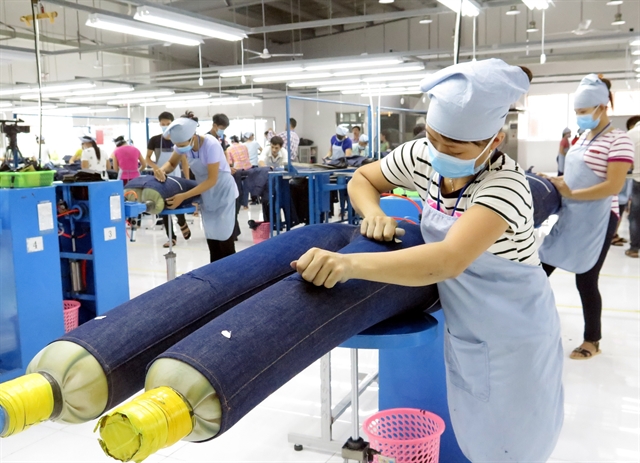 Economy
Economy


|
| The textile and garment industry has been heavily affected by COVID-19. — VNA/VNS Photo |
HÀ NỘI — The fourth wave of the COVID-19 pandemic in Việt Nam has caused hundreds of thousands of businesses across many industries to suspend production, leaving 1.8 million workers nationwide unemployed.
The pandemic has also affected the export of Vietnamese goods. The Việt Nam Textile and Apparel Association said that, because of the pandemic, the goal of reaching $39 billion in export turnover this year would be very difficult.
Discussing the impact of the COVID-19 pandemic on the textile and garment industry, Deputy General Director of Việt Nam National Textile and Garment Group (Vinatex), Phạm Nguyên Hạnh, told the Vietnam News Agency that despite the pandemic, many companies still met, or even exceeded, their production output targets.
However, due to a shortage of orders, many employees have had to stop working, directly affecting production activities and the long-term development plans of the textile industry.
In response, the Government, the Prime Minister, the Ministry of Labour, War Invalids and Social Affairs and relevant ministries agencies issued Resolution No 68/NQ-CP and Decision No 23/2021/QĐ-TTg, to support employees and employers, she said.
However, Vinatex’s Phạm Nguyên Hạnh said that the group has encountered difficulties in benefiting from the support. The group need the money to pay salaries to workers, due to work suspensions, and for the recovery of production.
These struggles are not just limited to the textile and garment industry. Businesses in other fields such as tourism, accommodation services, transportation, and aviation also need government support.
First, the obstacles in accessing the support funds, which total VNĐ26 trillion, need to be solved.
Although many public passenger transport businesses have submitted documents to borrow money to pay salaries for employees, these applications have not been approved as they are related to the confirmation of tax procedures.
In order to access capital through Resolution 68/NQ-CP, businesses must first meet the strict conditions of Decision No 23/2021/QĐ-TTg.
Nearly VNĐ21.89 trillion of the VNĐ26 trillion package has been delivered to 24.26 million people as of October 14. But in reality, there are still many workers and employers who have not yet accessed the funds.
At a recent seminar held by the Office of the National Assembly and the Economic Committee of the National Assembly, the Institute of Labour Science and Social Affairs pointed out that the coverage of cash support programmes is still low. The programme excludes disadvantaged groups such as unregistered migrant workers and freelance workers in the informal sector.
Coverage also varies from province to province as the programme relies on local governments for funding. The cumbersome regulations for grantees and employers have reduced coverage and disbursement rates.
A recent report by the Ministry of Labour, Invalids and Social Affairs clearly showed that the process of implementing Resolution 68/NQ-CP and Decision 23/2021/QĐ-TTg of the Prime Minister involves a number of regulations that are not really consistent with practice.
Due to the pandemic, some workers have not been able to travel to complete procedures. Some localities have not implemented any ways around this, which has led to slow implementation.
Due to the different development of the pandemic in many localities, it is still difficult to allocate funding, as much of the focus is still on measures to control the disease.
Untangling the web
Deputy Minister of Labor, War Invalids and Social Affairs, Lê Văn Thanh, said that in response to the difficulties in implementing the regulations, the Ministry has submitted a proposal to simplify procedures.
The Government issued Resolution No 126/NQ-CP, amending and supplementing Resolution 68/NQ-CP, on October 8. This added more beneficiaries to the scheme and reduced the conditions of receiving support.
Resolution 126 reduces the conditions for suspending contributions to retirement and survivorship funds; expanding the target group of policies to support employees; supplementing regulations on the additional support of VNĐ1 million per person for F0 or F1 who are the elderly and people with severe disabilities; removing the condition that business households have tax registration and clearly defining the support for business households.
Support in suspending labour contracts and taking unpaid leave is expanded, along with policies to support employees to stop working and to support employees in terminating labour contracts.
Resolution 126 provides support to employees working under a labour contract in all types of production, business, and non-business units, to ensure that no workers are overlooked.
The resolution also added cases where employees have to be treated for COVID-19, those in medical isolation, in blocked areas, and those who are not allowed to go to workplaces due to pandemic prevention and control measures.
The Minister of Labour, Invalids and Social Affairs, Đào Ngọc Dung, said that Resolution 68/NQ-CP allows for simpler procedures, and shorter assessments and settlements, creating maximum flexibility for localities.
The Ministry has asked agencies to implement policies to support employees in accordance with Resolution 68 and Resolution 126, amending and supplementing Resolution 68 of the Government. — VNS




